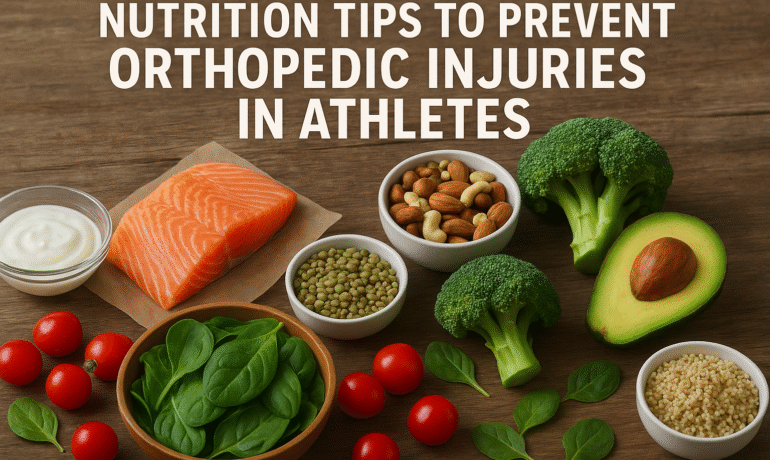Athletes constantly push their bodies to the limit, making them more prone to orthopedic injuries. A well-balanced nutrition plan for athletes plays a crucial role in strengthening bones, muscles, and joints. The right foods not only boost performance but also prevent conditions like fractures, sprains, and ligament tears.
1. Importance of Nutrition in Orthopedic Health
Proper nutrition for bone health is vital to maintaining strong skeletal structure and faster recovery. Nutrients like calcium, vitamin D, and protein support bone density and repair damaged tissues. Without adequate nutrition, athletes face a higher risk of orthopedic injury due to weak bones and muscle fatigue.
2. Essential Nutrients to Strengthen Bones and Joints
A nutrient-rich diet can reduce inflammation and support musculoskeletal strength.
Calcium: Found in milk, yogurt, and leafy greens; it enhances bone density.
Vitamin D: Helps absorb calcium and is best obtained from sunlight and fortified foods.
Protein: Critical for tissue repair and muscle growth.
Omega-3 Fatty Acids: Found in fish, chia, and flaxseeds; these reduce joint inflammation.
Magnesium and Zinc: Aid in collagen formation and faster healing of injuries.
Including these in your daily diet ensures optimal joint health for athletes and lowers the risk of fractures or ligament damage.
3. Hydration and Electrolyte Balance
Dehydration leads to muscle cramps and fatigue, increasing chances of sprains and strains. Maintaining hydration for athletes ensures flexibility and joint lubrication. Consume water regularly and include electrolyte-rich drinks or coconut water post-training to restore lost minerals.
4. Anti-Inflammatory Foods for Injury Prevention
Inflammation is one of the leading causes of muscle and joint pain. Add anti-inflammatory foods such as turmeric, ginger, olive oil, and berries to your diet. These natural antioxidants help repair tissues and prevent chronic inflammation that can cause sports-related injuries.
5. Timing and Balanced Diet Plan
Meal timing is as important as meal quality. Pre-workout meals rich in complex carbs and proteins provide sustained energy. Post-workout recovery foods like lean meat, eggs, and fruits help rebuild tissues. A balanced sports nutrition plan can significantly reduce injury risk and improve athletic endurance.
6. Supplements for Orthopedic Strength
While whole foods are the best source of nutrients, some athletes may require supplements. Calcium, Vitamin D, and Collagen supplements can support bone and joint health when dietary intake is insufficient. Always consult a doctor before starting any supplement routine.
7. Lifestyle and Recovery Practices
Adequate sleep, stretching, and balanced nutrition are essential parts of orthopedic injury prevention. Overtraining without proper recovery leads to fatigue and microtears in muscles. Ensure enough rest and recovery meals rich in protein and vitamins to maintain long-term orthopedic wellness.
Conclusion
A well-structured diet is the foundation of strong bones and resilient joints. Following these nutrition tips for athletes ensures better performance and fewer orthopedic injuries.
For athletes aiming to stay injury-free, focusing on proper nutrition, hydration, and recovery can make all the difference.

